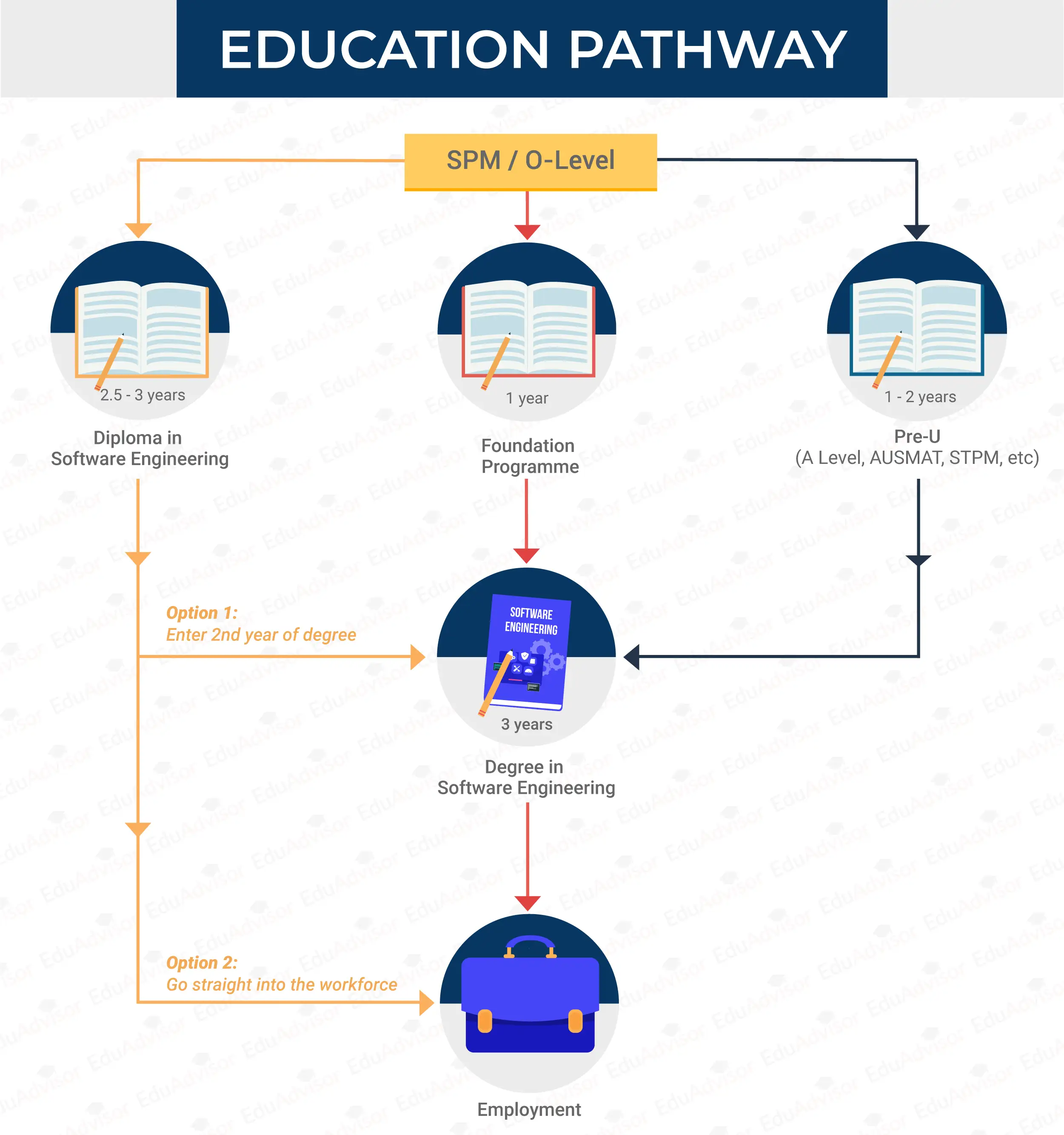The Complete Guide to Software Engineering in Malaysia
Explore the pathway to be a software engineer and learn about the requirements for a software engineering course, how much it costs and career prospects.

Behind every software is software engineering. And in a world dominated by software-riddled smartphones and devices, software engineering has never been bigger.
Curious to know more about the field of software engineering? We’ve got you covered.
This is everything you need to know about studying software engineering in Malaysia. In this guide, you will learn what it is, how much it costs, where to study the programme, what career paths you can pursue after graduating and more.
So if you’ve always dreamt of being a software engineer, keep on reading.
#1. The Basics of Software Engineering
a) What is Software Engineering?
 Software engineering is a subset of the computing field with a focus on designing, developing and maintaining large-scale software systems. The field integrates mathematics and computer science principles with engineering practices to ensure large software systems are reliable and efficient, affordable to develop and maintain, and satisfy customer requirements.
Software engineering is a subset of the computing field with a focus on designing, developing and maintaining large-scale software systems. The field integrates mathematics and computer science principles with engineering practices to ensure large software systems are reliable and efficient, affordable to develop and maintain, and satisfy customer requirements.
While it may sound a bit too technical for the everyday person, the field has impacted our lives in many ways. From online banking systems and airline reservation platforms to the mobile app games that you play while commuting to class, its presence can be felt everywhere. In fact, most of today’s wide-reaching technology is the result of careful software engineering, ensuring that the software that you are using is reliable, efficient and affordable.
Pursuing an education in software engineering will expose you to a variety of foundational modules that make up the field. You will learn the basics of computer science such as programming principles and algorithms. However, unlike computer science students, you will learn more about software reliability and maintenance, with a focus on developing and maintaining software that is right from the start. Your knowledge will also encompass the entire software lifecycle from requirements and design to testing, analysis and maintenance.
In short, you will receive well-rounded education on software development to design, build and maintain software that’s scalable, useful and reliable.

Asia Pacific University of Technology & Innovation (APU)
BSc (Hons) in Software Engineering
✓Dual-award degree – one from De Montfort University, UK, and one from APU
#2. Studying Software Engineering
a) Entry Requirements & Qualifications
To study software engineering, you must have studied these subjects for SPM or equivalent:
- Mathematics
- Additional Mathematics
(i) Diploma in Software Engineering
These are the general entry requirements for a Diploma in Software Engineering:
- SPM (or equivalent): Minimum 3Cs including in Mathematics
(ii) Requirements for Degree in Software Engineering
To pursue a Degree in Software Engineering, you need to complete a pre-university programme and meet the entry requirements.
- A Levels: Minimum 2Ds
- STPM: Minimum CGPA of 2.00 in any 2 subjects including in Mathematics
- Foundation in Science or Foundation in Computing: Minimum CGPA of 2.00
- Diploma: Minimum CGPA of 2.50
In addition, you will also need a credit in Additional Mathematics at SPM level or its equivalent.
If you do not have a credit in Additional Mathematics, you can still pursue a degree in software engineering by scoring well in the mathematics modules during your foundation or diploma, or by taking an extra mathematics course. This varies by university so be sure to do your research.

b) What subjects will you study in Software Engineering?
The software engineering programme aims to prepare you for a career in designing, developing and maintaining computer software at scale to meet the needs of a large volume of users. As such, you will be exposed to a variety of modules to help you have a firm grasp of the principles and practices of the field.
Some of the modules that you will learn include:
- Programming languages, principles and practices
- Mathematical concepts for computing
- Operating systems and computer networks
- Human-computer interaction (HCI)
- Software modelling and analysis
- Software design
- Software testing and quality assurance
- Software evolution
As part of your studies, you should also expect to participate in internships as well as final year projects that involve designing and developing your own software.
c) How long is a Software Engineering course?
A software engineering diploma typically goes for 2 to 2.5 years. A degree in software engineering, on the other hand, usually takes 3 years to complete, with some universities offering 4-year programmes.
d) How much does it cost to study Software Engineering in Malaysia?
A Diploma in Software Engineering typically costs around RM17,800 to RM48,000. Meanwhile, a Degree in Software Engineering can be approximately RM33,500 to RM209,500.

Asia Pacific University of Technology & Innovation (APU)
APU Foundation Programme (Computing & Technology)
✓Direct pathway into dual-award degrees at APU
#3. Your Education Pathway for Software Engineering
 The degree pathway begins with you enrolling and completing a pre-university (e.g. A Level, STPM) or Foundation programme after SPM. After that, you can immediately enrol into a Degree in Software Engineering. Completing this degree will allow you to enter the field of software engineering across various industries.
The degree pathway begins with you enrolling and completing a pre-university (e.g. A Level, STPM) or Foundation programme after SPM. After that, you can immediately enrol into a Degree in Software Engineering. Completing this degree will allow you to enter the field of software engineering across various industries.
Alternatively, you can also pursue a Diploma in Software Engineering. The diploma qualification would allow you to enter the workplace earlier. However, you can also choose to continue your study with a Degree in Software Engineering.

#4. Should You Study Software Engineering?
 a) Is software engineering right for you?
a) Is software engineering right for you?
If you’re wondering whether you should study software engineering, here are some questions to think about:
- Are you tech-savvy?
- Do you have a knack for computer programming languages?
- Do you consider yourself a math whiz with the ability to solve complex problems?
- Are you a creative person with strong analytical skills?
- Do you want to build large-scale computer programs and software?
- Are you interested in learning about the entire software development cycle as a whole?
- Are you always looking for ways to optimise and improve how you can use computers?
If you answered yes to most of these questions, software engineering may be right for you!
b) Skills required to be a software engineer
Here are some key skills a good software engineer should have:
- Strong programming skills
- Good at solving complex problems
- Ability to work well under a deadline
- Keen attention to detail
- Creative at finding solutions to computing problems
- Always looking for ways to improve how we use computers

Asia Pacific University of Technology & Innovation (APU)
BSc (Hons) in Software Engineering
✓Dual-award degree – one from De Montfort University, UK, and one from APU
#5. Job Options With Software Engineering
Curious about what you can do with a software engineering degree? A background in software engineering can open opportunities for not just software engineering roles but also other careers in computer science and information technology.
Here are some careers to look out for:
- Software engineer
- Web developer
- Game developer
- Software quality assurance (QA) specialist
- Applications developer
- Cybersecurity analyst
- Systems analyst
- Information systems manager
- Multimedia programmer
- Web designer
- IT consultant
Not feeling any of these options? With the increasing digitalisation of our society, software engineering can fit in almost any industry. Your computing background can make you a very desirable employee.
#6. Best Universities for Software Engineering in Malaysia
If software engineering is right up your alley, then check out these universities.
Asia Pacific University of Technology & Innovation (APU)
Bukit Jalil, Kuala Lumpur
BSc (Hons) in Software Engineering
Intake
Mar, Jul, Sep, Nov
Tuition Fees
RM98,300
Malaysia's award-winning Premier Digital Tech University
 a) Is software engineering right for you?
a) Is software engineering right for you?








